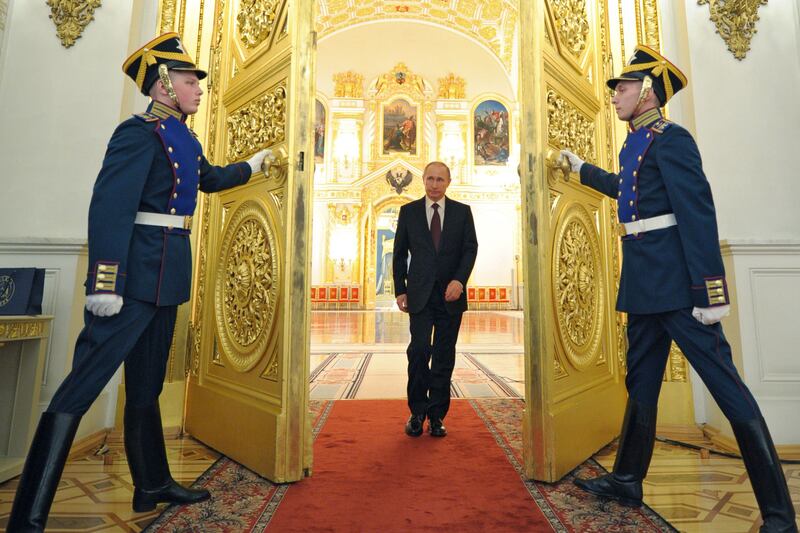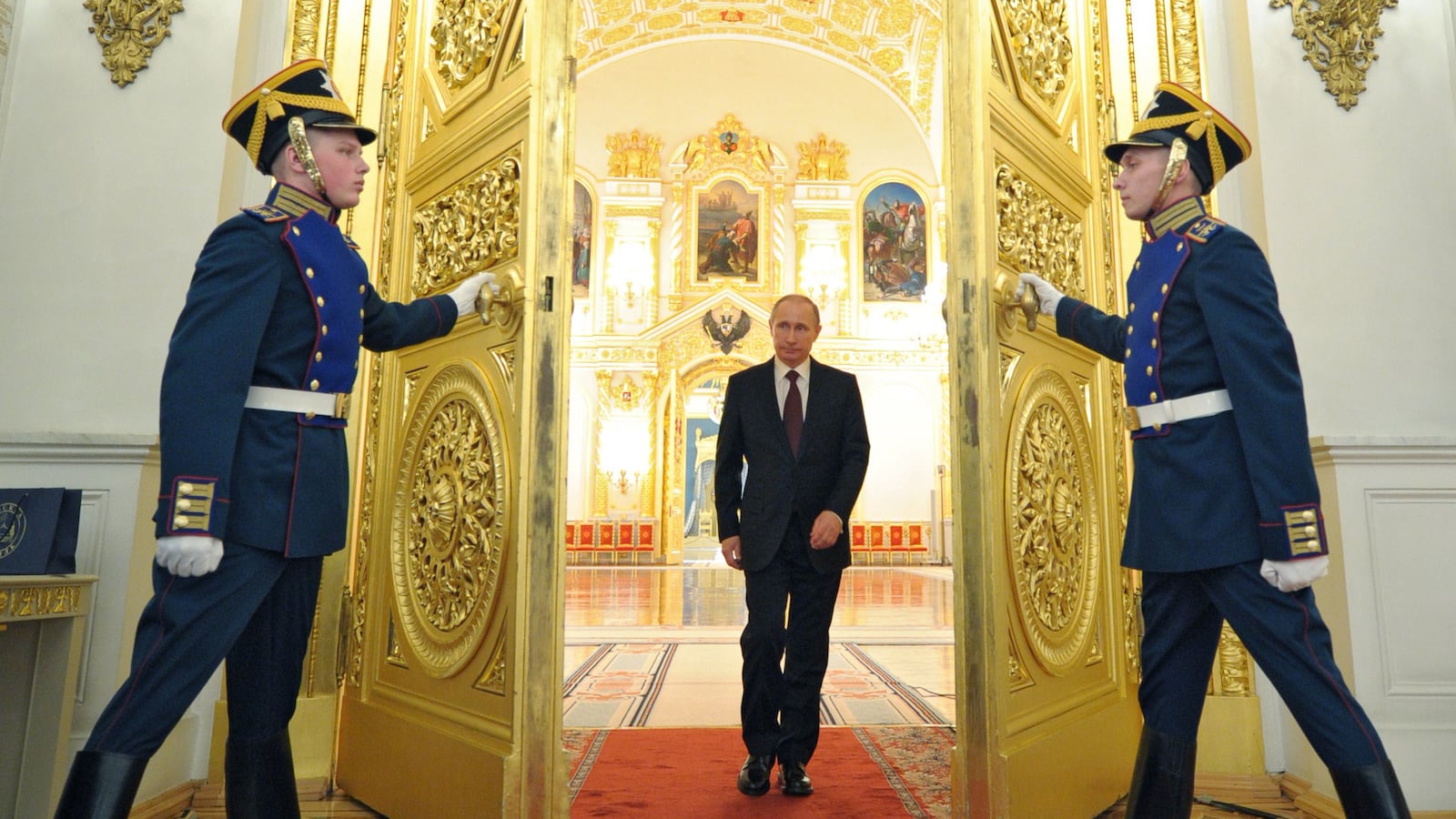A former top advisor to Vladimir Putin says the Russian president probably thinks at this point he can whip Ukraine back into line without having to resort to a full-blown invasion. Although it appears no Western power is willing to take military action to defend Kiev, overt Russian military action would risk deeper and more disruptive Western economic sanctions. So Putin’s willingness to play a longer-term game rests on his “cynical recognition” that he has three years to accomplish his objective before there is a change of leadership in the White House and the possibility of a more resolute American response.

“Putin’s objective remains to regain control of Ukraine, but I suspect he now thinks he can do this without ordering in the tanks,” says Andrei Illarionov, a former Putin economic policy advisor and now an unstinting critic of the Russian leader.
Illarionov tells The Daily Beast he expects Putin to maintain an intimidating offensive build-up of Russian forces along the Ukraine border, nonetheless, and that there will be no let-up in the fomenting of separatist agitation in the eastern Ukraine towns of Donetsk, Kharkiv, Lugansk and now Sloviansk. The aim is to destabilize Ukrainian politics, weaken Ukrainian state institutions and help Putin’s political allies reassert their power in Kiev.
Illarionov has predicted accurately various stages in the current Ukraine crisis, including his early warnings that the Kremlin would grab Crimea after the February ouster of Putin ally Viktor Yanukovych as Ukrainian President. Speaking in his office in the Washington D.C.-based think tank the Cato Institute, where he is a senior fellow, Illarionov warns, “Putin will not leave Ukraine alone until he has achieved what he wants – pulling the country back in the Russian orbit. And he will do that one way or the other.”
The threat of Russian military intervention combined with separatist agitation in eastern Ukraine already is bearing results. Last weekend pro-Russian activists seized government buildings in three towns. The new Ukrainian leaders in Kiev responded with threat, but finally offered greater autonomy and decentralization to the Ukrainian regions in a bid to appease separatist sentiment and quell disturbances.
On Friday, Ukrainian Prime Minister Arseniy Yatsenyuk repeated an offer he made earlier in the week to hand off more powers, saying that Kiev-appointed administrations in the provinces should be a thing of the past and the “power to rule the regions must be transmitted to the locals.”
While what Kiev politicians are offering falls short of federalization, some pro-Ukrainian activists fear any decentralization will push the country down a slippery slope that allows Russia to turn the eastern and southern regions into de facto protectorates of the Kremlin. Russia has been insisting on a federal form of government for post-Yanukovych Ukraine that would see the regions control tax-revenue and even pursuing foreign and economic policies different from the federal government.
Vladimir Ryzhkov, a former Russian State Duma deputy, argues Moscow’s strategy is “to weaken Ukraine’s government institutions as much as possible” and to maneuver the circumstances where eastern and southern regions would “align themselves more with Moscow than with Kiev.”
A poll released last week by the U.S. government-funded International Republican Institute, a non-profit democracy group, shows support for decentralization is low in Ukraine. Just 14 percent of Ukrainians across the country support federalization, according to the poll. In the south and east the percentages rose to the mid-20s. The poll roughly tallies with surveys by Ukrainian pollsters conducted last year before the fall of Yanukovych.
Despite the low support for decentralization, Russian Foreign Minister Sergei Lavrov has pushed the federalization argument relentlessly, publicly and in talks with American officials. “We are convinced that deep constitutional reform is required,” he argued in one Russian television interview. “Frankly speaking, we do not see any other way for sustainable development of the Ukrainian state other than a federal state.”
Lavrov claimed federalization would not only guarantee the protection of minority rights but give regions the authority to determine their ties with neighboring countries. Ukraine’s foreign minister says federalization would “divide and destroy Ukrainian statehood.”
Prime Minister Yatsenyuk’s devolution offer on Friday during a visit with other government officials to Donetsk has so far failed to satisfy the armed pro-Russian militants who stormed government buildings in the city and in other eastern Ukrainian towns. They are demanding a referendum for locals to choose whether to stay part of Ukraine or join Russia.
Separatists in Lugansk calling themselves the Southeastern Army are insisting Kiev recognize them as a formal military unit. Their leader, Aleksey Mozgovoy, visited Moscow midweek and met with Russian officials, although not with Putin. He dismissed Kiev’s talk of decentralization, arguing the “Western-backed Ukrainian government didn't want to consider people's opinion and give us an opportunity to hold a referendum. Now, when we have lost our patience, the government is trying to carry on a dialogue.” He says the separatists will continue to hold on to the government buildings they are occupying until a referendum date is set. Today a police station in Sloviansk became the latest set of offices to be occupied.
Former Putin adviser Illarionov says the agitation will continue and estimates that at least 2000 Russian intelligence officials are operating in eastern Ukraine. “Putin will seek to intimidate, apply pressure and destabilize.” And throw money around. “Watch out for who is selling Ukraine,” he says.
Illarionov says the Kremlin will be determined to either cause a postponement of slated presidential elections next month or to cast doubt on the polls’ legitimacy. There are two current frontrunners – confectionary billionaire Petro Poroshenko, an oligarch nicknamed the “Chocolate King” who backed the anti-Yanukovych uprising from the start, and former Prime Minister Yulia Tymoshenko, who was released from jail at the tail-end of the uprising. She is trailing Poroshenko in opinion polls, and her weak showing doesn’t surprise some commentators. For many of the young she is seen as a throwback to a past few want to see repeated. Corruption allegations continue to dog her, although the graft charges she was jailed on by the Yanukovych administration appeared to most Ukrainians as politically motivated.
Putin has hinted publicly that he favors Tymoshenko, noting they had a productive relationship when she was prime minister. In recent days allegations have been swirling in Kiev that at a March 1 Ukrainian Security Council meeting she invited herself to she pressed hard for the new government to avoid any confrontation with Russian forces. Ukrainian business sources claim she has also been trying through allies to disrupt a nuclear parts business deal involving America’s Westinghouse in a bid to steer the contract to a Russian company.
Putin, after all, is not the only cynic on center stage in the Ukraine crisis.






